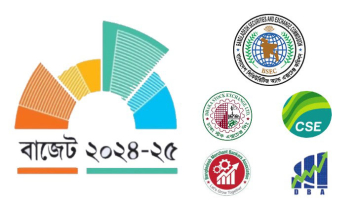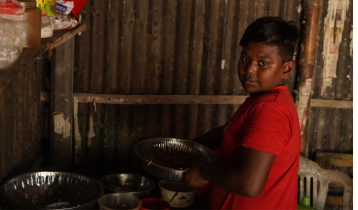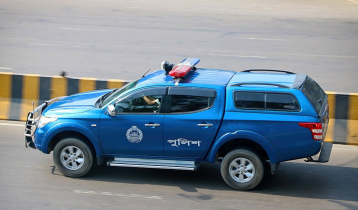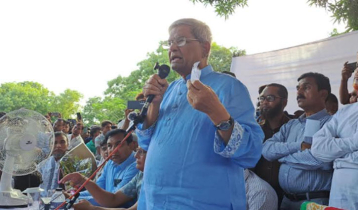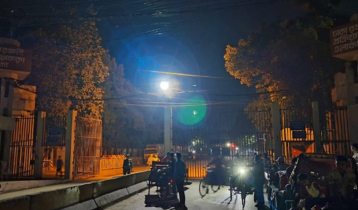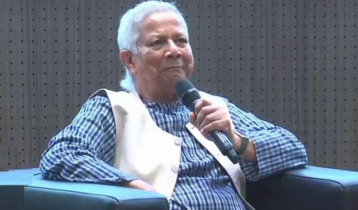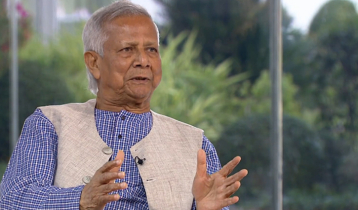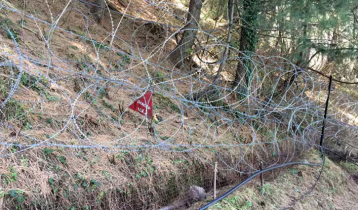Is Bt Brinjal is poisonous or nutritious?
Manzurul Alam Mukul || risingbd.com
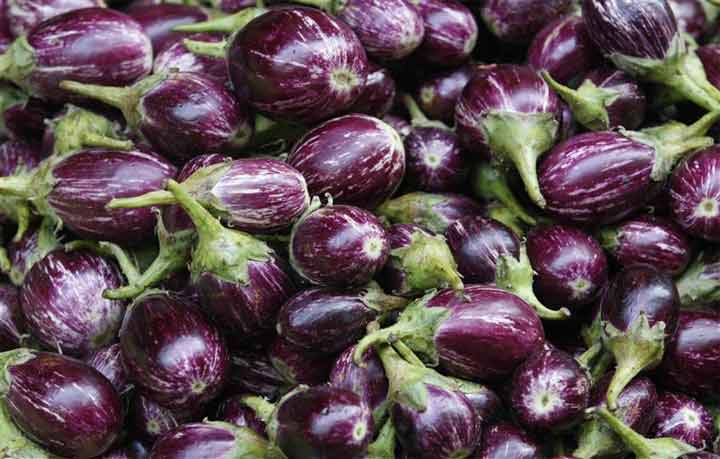
Manzurul Alam Mukul: There is none who prefers a dish of Brinjal like fried, mashed or Brinjal curry with fish. The vegetable is not only testy but also very nutritious. It is a very good source of fiber, calcium, phosphorus, folate, and vitamins B and C. It is also helpful for curing diabetes, hypertension, obesity and colon cancer and increasing memory and skin’s brightness.
Brinjal is called as ‘King of Vegetables’ and it is popular amongst all kind of people. From the ancient period, Brinjal is featured in the dishes of virtually every household in Bangladesh, regardless of food preferences, income levels and social status. It has embedded itself deeply into the Bangalee culture. Numerous folk songs in Bangla languages center on the humble vegetable.
But the recent controversial about Bt Brinjal has created a panic among the farmers and consumers. The government authorities and anti-GM activists are locked in a war of words. Neither of the two groups is showing any sign of backing down.
What is the Bt Brinjal?
Brinjal is prone to attack from insect pests and diseases, the most serious and destructive of which is the fruit and shoot borer (FSB) Leucinodes orbonalis. It poses a serious problem because of its high reproductive potential. FSB larvae bore into tender shoots and fruits, retarding plant growth, making the fruits unsuitable for the market and unfit for human consumption. Fruit damage as high as 95 percent and losses of up to 70 percent in commercial plantings have been reported.
Usually, farmers are to spray frequent pesticides to counter the threat of FSB, making the vegetable highly toxic. Although, several attempts have been made to develop resistant cultivars through traditional plant breeding, these have met with limited or almost no success. From this perspective, using biotechnology scientists have developed Bt Brinjal variety that can resist FSB attack. The Bt Brinjal has been created by inserting a crystal protein gene (Cry1Ac) from the soil bacterium Bacillus thuringiensis into the genome of various brinjal cultivars.
BT Brinjal in Bangladesh
Brinjal known as eggplant is considered as the crop of Asia region, and it is an indigenous vegetable plant and a very important common man’s vegetable in India subcontinent. Historically, Bangladesh is home to a vast number of varieties and is one of the largest producing countries in the world.
Brinjal, being a hardy crop that yields well even under drought conditions, is grown in almost all parts of the country. Many Brinjal varieties have been carefully selected by farmers based on hundreds of years of experience with their cultivation and consumption. It is an important cash crop for many small, marginal and resource-poor farmers.
According to sources of Bangladesh Agriculture Information Service, brinjal is cultivated about 15 percent of vegetable crop cultivation land in Bangladesh.
In backdrop of different issues, Bangladesh Agricultural Research Institute (BARI) has developed some Bt Brinjal varieties in a bid to give a boost to the cultivation of Brinjal.
Multinational seed giant Monsanto and its Indian ally Mahyco, with the financial assistance of the USAID, developed the Bt gene technology. In 2005, Monsanto, Mahyco and USAID launched a project to introduce Bt. Brinjal in India, Bangladesh and Philippines. In that year (2005), BARI signed an agreement to introduce it in Bangladesh. After signing the MoU, BARI made a multi-disciplinary committee with biotechnologists, soil scientists, plant breeders and entomologists to speed up its research activities.
After seven years of extensive research, BARI developed transgenic Bt. Brinjal by inserting Cry 1 Ac genes in nine popular varieties.
On October 30, 2013 with approvals from the ministries of Environment and Forests (MoEF) and Agriculture (MoA), BARI received permission to release four varieties of Bt brinjal in time for the 2013–2014 growing season.
Earlier the anti-GM protesters were jubilant as the High Court blocked the move to release it in September last year. But their happiness was short-lived because within weeks the government succeeded in obtaining a court order favouring the release of Bt Brinjal.
On 22 January 2014, seedlings of Bt Brinjal were distributed through a formal ceremony among 20 farmers of Gazipur, Pabna, Rangpur and Jamalpur districts.
Explanation of Bt Brinjal’s authorities
Bangladesh Agricultural Research Institute (BARI), the authority to introduce Bt Brinjal in Bangladesh, has claimed that introduction of BT Brinjal is the latest development of agriculture science. The development of Bt Brinjal, the first biotech vegetable crop, is an appropriate and timely step. It has enormous potential to benefit both farmers and consumers and will play a significant role in ensuring food security in the country.
The specialty of the BT Brinjal is that the farmers do not need to spray pesticides on it.
Director General of BARI Dr. Rafiqul Islam Mondal says, “BT Brinjal is very effective against the key pest-the fruit and shoot borer. Traditionally, farmers who plant the conventional non-BT Brinjal tend to take 60-180 sprays per season, against a recommended dose, making the vegetable highly toxic”.
“Bt Brinjal farmers do not take even a single spray of pesticide, and as a result farmers can get expected production and earn money for low production costing”, Rafiqul Islam Mondal says.
Before handing over to farmers, Bt varieties were put to field tests and trials in various environmental and geographic locations in Bangladesh. On the basis of research carried out for more than seven years, BARI authority applied to the NTCCB for Bt Brinjal variety releasing. NTCCB core committee sent the application with recommendation to BCC. After evaluation and recommendation, BCC (Biosafety Core Committee) released it, claims BARI DG.
Dr Rafiqul Islam Mondol also claims that no harmful effects of Bt Brinjal were found on mammals in their laboratory tests. Rigorous scientific tests and nutritional studies carried out on rabbits, rats, carps, goats, broiler chickens and dairy cows, and it is proved that Bt brinjal is as safe. Results of the studies demonstrated that Bt Brinjal does not affect beneficial insects such as aphids, leafhoppers, spiders and lady beetles.
Nutrition facts are same like conventional Brinjal. Cry 1 Ac enriched Bt. Brinjal’s food value and chemical facts were subjected to several rigorous and tests in the standard national and accredited foreign laboratories. But no report was found that are harmful for human heath, bio-diversity and environment, BARI claims.
Brinjal is a self-pollination plant. So, there have no reason to pollinate with local varieties. Farmers can collect their seed from fields because BT. Brinjal is not hybrid variety.
The insect-resistant BT Brinjal varieties have been developed through close and harmonious cooperation between public and private research institutions. Farmers will not depend on a selected seed company and farmers will not pay any royalty while they farming, BARI claims.
BARI also claims that farmers successfully produced Bt. Brinjal with the distributed seedlings and sold the products in the market. The farmers gained profit by selling products. One or two farmers could not be successful as they failed to follow the production guidelines properly.
Speeches of protesters
On the other hand, the anti-GM activists are locked in a war of words, and they are not agreed to accept the opinions of pro-Bt Brinjal activities.
According to protesters, Bangladesh is the first country to cultivate the Bt Brinjal although it has been barred from India and the Philippines because of risks for both human and nature.
Environmental activists have expressed their concern that it will affect biodiversity and also cause severe health hazards to humans, animals and plants. It has devastating impacts on indigenous brinjal and other crop varieties through pollination.
“Insects do not eat Bt Brinjal so it cannot be a flood item”, the protesters opine.
Demanding stop of cultivation of Bt Brinjal, Syeda Rizwana Hasan, the chief executive of Bangladesh Environmental Lawyers Association, says “The government has appeared as a service provider of Monsanto and Mahyco. The companies have failed to release Bt Brinjal in India and the Philippines, but the government is using political influence to popularize it among poor farmers in our country”.
Green groups like Ubinig allege that the government has introduced GM food crops in Bangladesh without following all the prerequisites properly.
UBINIG executive director Farida Akter has apprehended that the corporate companies are creating way for genetically modified rice and other crops in Bangladesh through Bt Brinjal.
Ecology and biodiversity conservation researcher Pavel Partha says that the government and the companies are using propaganda about Bt Brinjal.
Bangladesh Fruits, Vegetables and Allied Products Exporters Association adviser Monjurul Islam says that the government is going to shrink the market of Bangladeshi vegetables in Europe through cultivation of genetically modified crops.
Farmers’ reaction
In the latest development, Bangladesh Agricultural Research Institute (BARI) invited the farmers involved in cultivation of Bt Brinjal to tell their success stories to journalists.
The move was reportedly meant to counter the green groups who invited farmers to talk about their crop failure and demand compensation.
At a press conference at Dhaka Reporters’ Unity recently, some farmers who were given Bt Brinjal plants demanded compensation for huge losses they incurred cultivating the crop.
Only one of the 20 Bt Brinjal fields succeeded, while 13 were fully and the rest six were partially damaged, the organisers of the press conference said.
Bt Brinjal farmers from Gazipur, Jamalpur and Sherpur attended the press conference, while the organisers alleged that other farmers from Rangpur and Pabna were barred from attending the press conference by the institute officials and ruling party men.
They also urged the farmers not to cultivate Bt brinjal any more and protest against any government move to further release of Bt brinjal saplings.
However, BARI claims that farmers successfully produced Bt. Brinjal with the distributed seedlings. One or two farmers could not be successful as they failed to follow the production guidelines properly.
Public Opinion
Taking to risingbd, Wahida Muntasir, a school teacher, says, “Brinjal is my favorite vegetable. But recent controversy concerns me like others. I am to think when I want to purchase brinjal from market. We should come into a decision about the popular vegetable”.
SM Hasanuzzaman, a bank officer, says that marketing of BT Brinjal has not begun massively in the country, but recent media reports have pushed me into a very concern over purchasing the vegetable from the market.
It is learnt that many countries have a strong ban on GM products on the grounds of human health and environmental issues. It is also reported that BT Brinjal has been barred from India and the Philippines because of risks for both human and nature. In this circumstance, it should be clear to the people about the tests that prove BT Brijal has no long-term impact on human health and environment or if has, an expert opines.
The government should form a joint national committee comprising experts from authorities, scientists, environmentalists, civil society members and anti-GMO experts to reach a strong consensus about the testy and nutritious vegetable.
Risingbd/Dhaka/Nov 28, 2014/Mukul
risingbd.com


